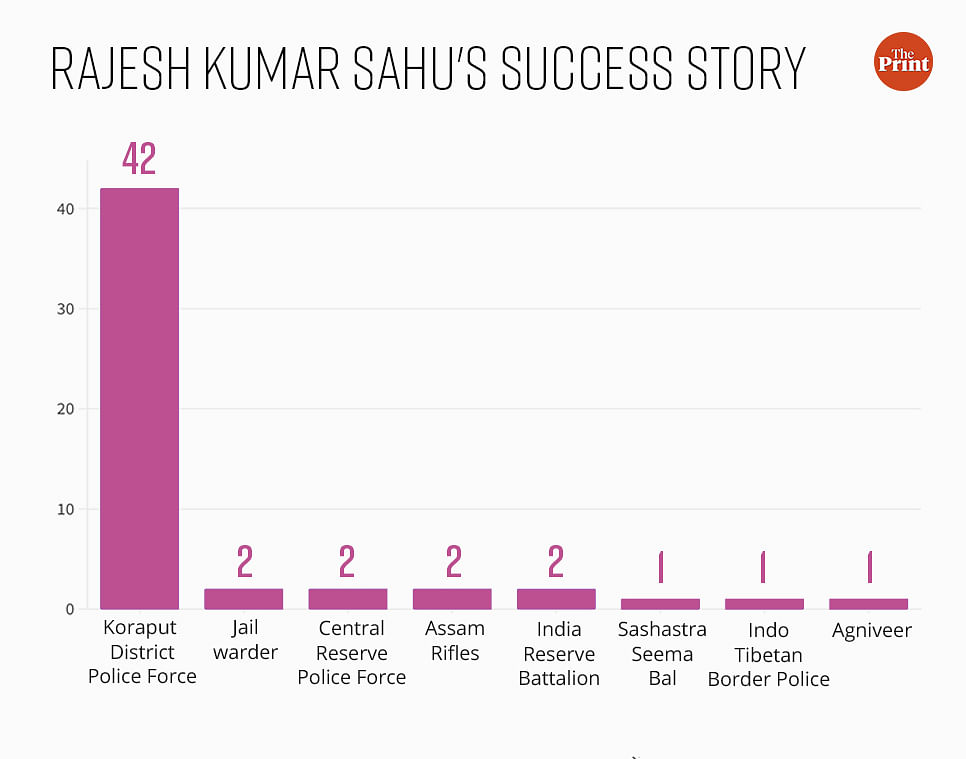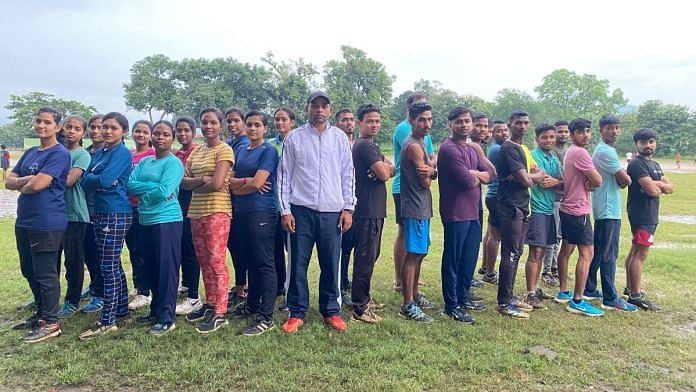Koraput (Odisha): Her fingers caked with mud, Bhaleshwari Barik drops into a push-up. She can no longer tell her sweat from the fat drops of rain that have drenched the ground at Vikram Dev University in Odisha’s Koraput district. A voice cuts through the downpour. “Let’s start,” roars Rajesh Kumar Sahu, a havaldar in the Odisha Special Armed Police. And Barik follows his order and sprints across the field as if her life depended on it.
In Koraput, one of Odisha’s most backward districts, a government job or a placement in the armed forces is highly coveted. And Sahu (42) is their pathfinder, trainer, and counsellor. He helps the residents’ CRPF, ITBP, BSF, and police dreams come true.
Over the last five years, he has trained as many as 200 students, mainly from Koraput and Jeypore but also from nearby districts like Rayagada and Nabarangpur. So far, 53 of them have made it to the district police force, Assam Rifles, India Reserve Battalion, and the Indian Army under the Agniveer scheme. Many train under him for years until their selection or move on to other jobs; others stay only for a few months.
Nobody is paying Sahu to carve out time in his already hectic schedule at the Odisha Special Armed Police (OSAP) to train aspirants. It’s a mission that he’s taken upon himself, having done his time in the metaphorical trenches of the armed police force.
“I started this in 2018. I told myself that I have to serve my motherland while I also serve my country (Desh seva ke sath janmabhoomi ki bhi seva karni hai),” says Sahu.
He wants to even the playing field while helping a new generation of aspirants from low-income groups in Odisha.
“When I was young, there was no one to tell me what to do with my career to create a better livelihood for myself,” says Sahu, who grew up in a poor family. “I got selected in my seventh attempt. But when I got into the training, I found there were very few people from my district.”
Hum Fauji
There is no structured academy, but there is ‘Hum Fauji’—the WhatsApp group that Sahu has created.
Every day for two hours in the morning, sometimes as early as five, and then in the evening, he trains young men and women for the physical component of the various competitive examinations. Through a friend, he roped in two teachers from an NGO to help them prepare for the written examination.
When people start getting selected, other parents start approaching me to train their children as well. Almost every student comes from an economically weaker background—Rajesh Kumar Sahu
Barik joined Sahu’s team around five months ago, but she is also studying for the UPSC with the hope of joining the civil services.
When duty keeps Sahu away, he sends his students detailed WhatsApp instructions: ‘5km running, 100 push-ups, high jump and long jump practice, send the picture after the workout.’

Lack of resources and money is something Sahu says he can work around. He solved his first hurdle—location—by getting permission from Vikram Dev University to use their grounds.
“Many local residents come to our grounds to walk or work out. We have no problem with Rajesh Sahu using the grounds as long as it does not clash with the college timings, which start at 8.30 am,” said a staff member with the college administration.
But time management is one thing Sahu continues to struggle with even after all these years.
“I take one month’s leave when important exams are being held. Now the fireman exam is around the corner [last week of November], but I have no leaves,” says Sahu. So he’s compensating by spending more time on the training ground.
I want to change my family’s condition but there are no training centres in Jeypore or Koraput, and I can’t afford the ones in Bhubaneswar. Having someone like Rajesh sir guide us is a luxury—Seema Kumari, a CRPF aspirant
There are 941 vacancies for firefighters and drivers and the three-stage recruitment process will include a written examination, physical efficiency test, and document verification. Sahu’s cohort is guided every step of the way.
“If my duty starts early in the morning, I call the students in the evening. On some days I train them twice a day,” he added.
This year, seven people from his training group were recruited into the CRPF. And this is his biggest achievement and advertisement. Word spread from town to village to city across nearby districts.
“When people start getting selected, other parents start approaching me to train their children as well. Almost every student comes from an economically weaker background,” says Sahu, as he surveys the group train.

I was crazy about my job from the beginning. And when I joined I got to know there are many opportunities where I can improve myself. I rescued people in Bengal when Amphan happened and fought with naxalites—Rajesh Sahu
Twenty-two-year-old Seema Kumari finishes her 5 km run in easy strides. Her hair remains neatly tied in a ponytail and her black bindi is firmly fixed on her forehead. It took her time to reach this level of fitness. When she had joined four months ago, she could barely do a few full body push-ups. Slowly she built it up to 20, and now she can do 35 at a stretch.
Kumari, who is in senior college, wants to join the CRPF. Her mother is a domestic worker, but she wants more from life.
“I want to change my family’s condition but there are no training centres in Jeypore or Koraput, and I can’t afford the ones in Bhubaneswar. Having someone like Rajesh sir guide us is a luxury,” she said before she starts running again.
Her mother Tara Devi is proud of her determination to make a better life for herself. “Some girls got the job from Rajesh sir’s training and I want that for my daughter too. I will be very happy when my daughter gets to wear a uniform,” Devi said.

In the beginning, Sahu used to only train students for the physical and fitness tests. But he soon realised that it was not enough. Successful candidates had to pass a written examination too.
Around four years ago, a friend helped him get in touch with the non profit SEWA, which took over the written part of the training.
Three months before every recruitment examination, SEWA teachers conduct daily classes at their Jeypore centre. “We teach them maths, reasoning, general knowledge and Oriya language,” says Soumya Seewa, a teacher associated with SEWA NGO. Each session runs for two-three hours and class strength varies from 60 to 100.
I started this in 2018. I told myself that I have to serve my motherland while I also serve my country (Desh seva ke sath janmabhoomi ki bhi seva karni hai)—Rajesh Sahu
Success and disappointment
Everyone on the training field is talking about Gauri Shankar Bisoi. As a child, the 25-year-old dreamed of joining the army. His farmer father didn’t want that future for him. Bisoi wanted to continue studying in Jeypore, but the family had no money to support him. He left his village in Nabarangpur district, began working as a security guard at a car showroom in Jeypore, and turned to Sahu for help in 2019.
The year Bisoi joined Sahu’s group, he went to Gopalpur district for a test at an army recruitment camp. Bisoi was ecstatic when he cleared the race and the physical round, but elation curdled into devastation when he couldn’t clear the medicals.
“My whole life was shattered in front of me. I wanted to go back to my village but Sahu sir saved me and my dream,” he told ThePrint over the phone from Bhubaneswar where he is completing his training programme. Sahu convinced Bisoi to continue to train and try for posts in other armed services.

“Young people like me have talent but do not have the platform or guidance; Sahu sir gave us that. I don’t really know about superheroes, but for me he will always be my hero,” said Bisoi, who works as a constable with the Odisha police.
Bisoi wasn’t the only one who, driven by frustration and disappointments, almost walked away from it all. But “Sahu sir” kept them on track.
Morale of the aspirants had taken a beating when recruitments to the Indian Army were suspended due to the Covid-19 pandemic. In 2021, Sahu spent around Rs 50,000 of his own money to take 40 aspirants to the Gopalpur army recruitment camp. It was nearly 350 km away, and he paid for their bus, stay, and food.
Initially, it all was all worth it because eight students got selected. But they never got a chance to prove their mettle. “The recruitment process was discontinued as Agnipath Yojana was introduced in June 2022,” he recalls.
His students were heartbroken. Of all the coveted posts, the army was their ultimate goal. It was a hard time for Sahu. He once again found himself trying to motivate young men and women urging them to go after other opportunities.
But Sahu has got them training for the Agniveer Yojana. “If we can serve the country for four years then so be it,” said a student.
A place for the dreamers
In the 20 years that Rajesh Kumar Sahu has been with the Odisha Special Armed Police, he’s been part of cyclone aid and rescue initiatives, and anti-naxal operations where he completed the elite Greyhounds training programme in Hyderabad. He was part of the 500-member team that was sent from Odisha when Cyclone Amphan hit West Bengal in May 2020.
“I was crazy about my job from the beginning. And when I joined I got to know there are many opportunities where I can improve myself. I rescued people in Bengal when Amphan happened and fought with naxalites,” Sahu said. “To get Greyhounds training, one has to be selected and very few people got it and I was part of it.”
There are times when a few of his students live in his quarters with his wife and eight-year-old son. The wall of the main room is filled with framed certificates awarded to him over the years.

“Some students live more than 30km away and can’t travel back home every day. So I take them to my home,” said Sahu, who lives in a two-room OSAP quarters in Koraput district.
At work, a majority of his fellow armed police officers support and encourage him in his initiative, but that does not protect him from the occasional snide comments. A few of his colleagues worry that his ‘extra-curricular’ activities will be seen as a distraction by the senior officers.
When a local website wrote about him, Sahu got a call from Odisha’s deputy inspector general of police Rajesh Pandit. He was nervous when he was summoned to the office.
“My colleagues were also scared. They kept saying that I was going to get everyone into trouble, but DIG sir praised me for my work. I felt very good that day,” said Sahu.
Other IPS officers in Odisha also praised Sahu. “This is such a great thing. It builds confidence among the public to join the armed forces,” said Charan Meena, DIGP, South Western Range, Koraput.
Now, Sahu wants to build his own academy to train army aspirants—a brick-and-mortar Hum Fauji centre that exists beyond WhatsApp groups. And he’s already inching his way towards this goal.
A few months ago, he took a Rs 16 lakh bank loan and withdrew another Rs 8 lakh from his provident fund to buy a three-acre plot, around 10 km from Korput.
“This will be the place where the small dreamer will find wings in the sky and it will be named Hum Fauji,” said Sahu.
(Edited by Prashant)



